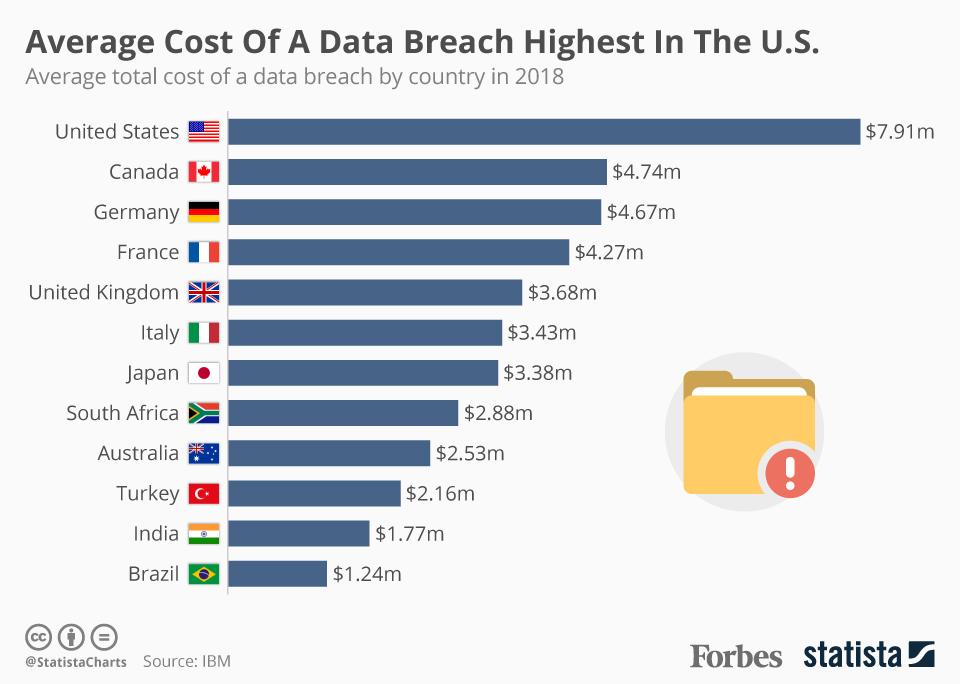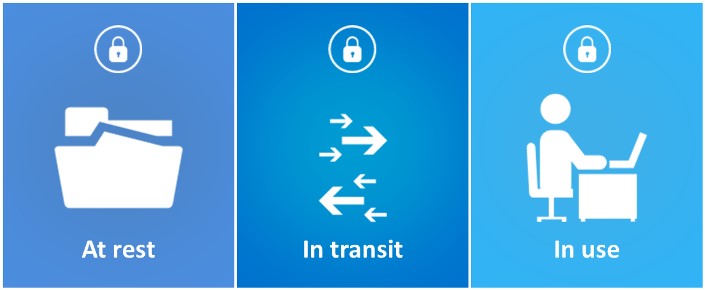Nowadays, companies regardless of their size have very important data for their business to survive and succeed. So, whether you collect e-mail addresses from your users to send newsletters or have an e-commerce website that needs credit card information, you hold important data of your visitors in your hands. This is in addition to the operational data of your own business. Consequently, data privacy is a very critical factor that may impact the business’s fate.
What would happen if this data is leaked or lost? What is the impact of data loss for SMBs? And, more importantly, how can you protect your business’s data privacy? This what we will discuss in this article.
Within the past few years, the idea of data privacy has come to represent a very valuable asset for businesses. In parallel, SMBs may face financial losses if they suffer a data privacy breach, we can see the average total cost of data privacy breach that affects all businesses by country in 2018 below.

And according to Microsoft’s report, the potential cost of cybercrime to the global community is 500 billion dollars, and a data breach will cost the average company about 3.8 million dollars.
50% of online adults, about half of online adults were cyber crime victims in the past year.
Is my business at risk?
Your business might actually be at risk of a data privacy breach. There are a few reasons that might jeopardize the data your company stores. Reviewing these potential areas of risk can help you better manage the way you handle your customer data.
Your staff:
Your employees are one of the top reasons for data loss if they have not been educated in how to keep important information secure. They may accidentally click on embedded malicious links in a spam email disguised as a legitimate message. Sometimes these links may also lead to a phishing websites, making the risk of exposure greater. Something as simple as using weak or default passwords, or installing non-trusted applications may put you at risk of a hack or malware attack.
Your security policies (or lack thereof):
The lack of data security policies in entities is one of the core reasons too. Your business may be a potential data breach victim, so you should ensure that you have some basic security policies or rules that your employees must follow is always a good idea.
Security solutions:
The lack of network and endpoint security solutions is another reason behind privacy breaches. Without security software in place, you are making a hacker’s task easier. So, you should consider endpoint and infrastructure security to protect you against and hackers who could attempt to steal or hold your data ransom. Having a protective measure in place against encryption by .
Lack of backups:
The lack of periodic data backup might put your data at risk. If you don’t regularly backup your data, deletion may result in a complete loss of all your customer and website data, and without a plan to restore it. Having backups and a recovery plan in place ensure you are ready in case you need to deal with such a situation, and will help you recover from it with less damage and in shorter time.
Data Privacy protection: How?
To better understand how to protect your data you need to know the following. There are three types of data: data at rest, data in motion, and data in use.

Data at rest
Can be stored on cloud, hard drives, backup tapes. This kind of data is not active, which means it isn't travelling over the network. This means that we can protect it by using encryption, access control, 2 factor authentication and backup.
Data in motion
It is transmitted and exchanged across networks or may reside in the RAM < the main memory in a computer,-to be processed or read. This type of data can be emails, files transmitted over ftp or http etc.
Data in motion can be protected by using strong cryptography techniques, secure protocols and secure channels for transmission.
Data in use
It is the data that resides at your endpoints, which makes your task to protect it the most difficult. Due to its variety; this kind of data should be protected by setting proper permissions for accessing it, identity management and security awareness for your employees.
Data privacy is important, even if you have a small business. In order to earn your clients’ trust, they have to feel protected and what better way is there of ensuring this than to protect their data?
Protect your online presence
As a business owner you need to protect your systems and devices that contain or have access to your sensitive information. Below, we’ve listed best practices to ensure you’re protecting your data:
- Make sure than you’re using strong and complex passwords . You can make them very difficult to crack as well as always changing the default passwords, and updating regularly.
- Use secure protocols such as SFTP instead of FTP and SSH instead of TELNET. Protect your website with an SSL certificate. SSL Certificates protect your customers' sensitive information by encrypting the data they send to you, then decrypting it once you’ve received it. Moreover, having periodic website backups to ensure that you never lose the data.
- Provide training to your employees regarding security awareness and best practices. Inform and teach them to be cautious and aware when it comes to how to identify and deal with emails that may contain malicious links and attachments.It is also vital to install an effective anti-malware (endpoint security solution). So even if your website gets hacked you have a layer of security that will help you clean up the malware and ensure your site is restored. .
When it comes to data privacy, you always have to be alert and ready. You should try to be one step ahead of any breach.
There are countless ways to protect your data and your client’s privacy, so, take the time to implement some key security measures and save yourself the headache of dealing with a potential breach.








